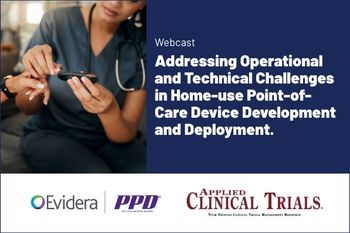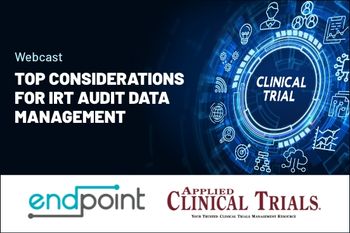
Webinar Date/Time: Thu, Mar 16, 2023 11:00 AM EDT

Webinar Date/Time: Thu, Mar 16, 2023 11:00 AM EDT

Webinar Date/Time: Thursday, March 30th, 2023 at 10am EDT|7am PDT|3pm BST|4pm CEST

Webinar Date/Time: Mon, Feb 13, 2023 10:00 AM EST

Webinar Date/Time: Tue, Feb 21, 2023 11:00 AM EST

Webinar Date/Time: Thu, Jan 26, 2023 11:00 AM EST

Webinar Date/Time: Tuesday, January 24th, 2023 at 11am EST|8am PST|4pm GMT|5pm CET

Data validation, consistent communication, and meticulous documentation all keys to successfully switching CROs.

Regulations that apply across geographic borders can provide researchers and patients a firmer foundation on data protection.

Final presentation at DIA reminds: "we are all patients."

Despite prevalent use in electronic devices, NRS and VAS are often implemented suboptimally.

Study shows more support is needed for clinical teams to ‘FAIRify’ their data.

Survey results emphasize need for flexibility in strategies.

Accelerating trends in clinical data are forcing changes in strategy.

Greater flexibility in eCOA solution could reduce need for backups.

How these tools can help expand capacity while maintaining compliance.

Pandemic aside, remote solutions are advancing care in clinical trials.

Martin Gouldstone, Global SVP, business development, Owkin, speaks to ACT on the use of AI in data practices and approaches for clinical research, and the distinction of “ethical AI."

Remote inspection and ICH guidelines among topics discussed at Veeva's most recent TMF Innovation Forum.

Presenting how data transformation is measured as part of the SAFE Data Standard, which data variables influence the rating and, how the appropriate level of data transformation is calculated.

Data is the heart of clinical trials, so life sciences firms need to integrate their technology to keep data sources and trial portfolios up-to-date and secure.

How management of trials must evolve.

Stakeholders from across the industry must discuss ownership to ensure effective implementation.

With an AI-enabled virtual assistant as part of your clinical research toolkit, deriving insights from clinical data is as simple as asking a question.

Improving receptivity and response to the evolving nature of clinical trial patient oversight.

Embracing patient empowerment in data collection can lead to new standard of care.